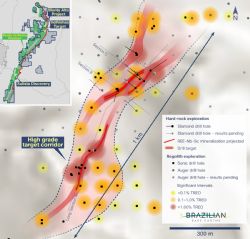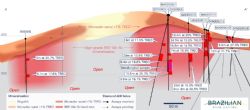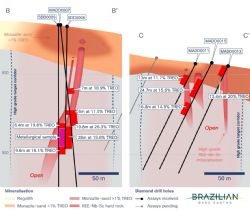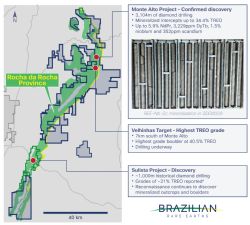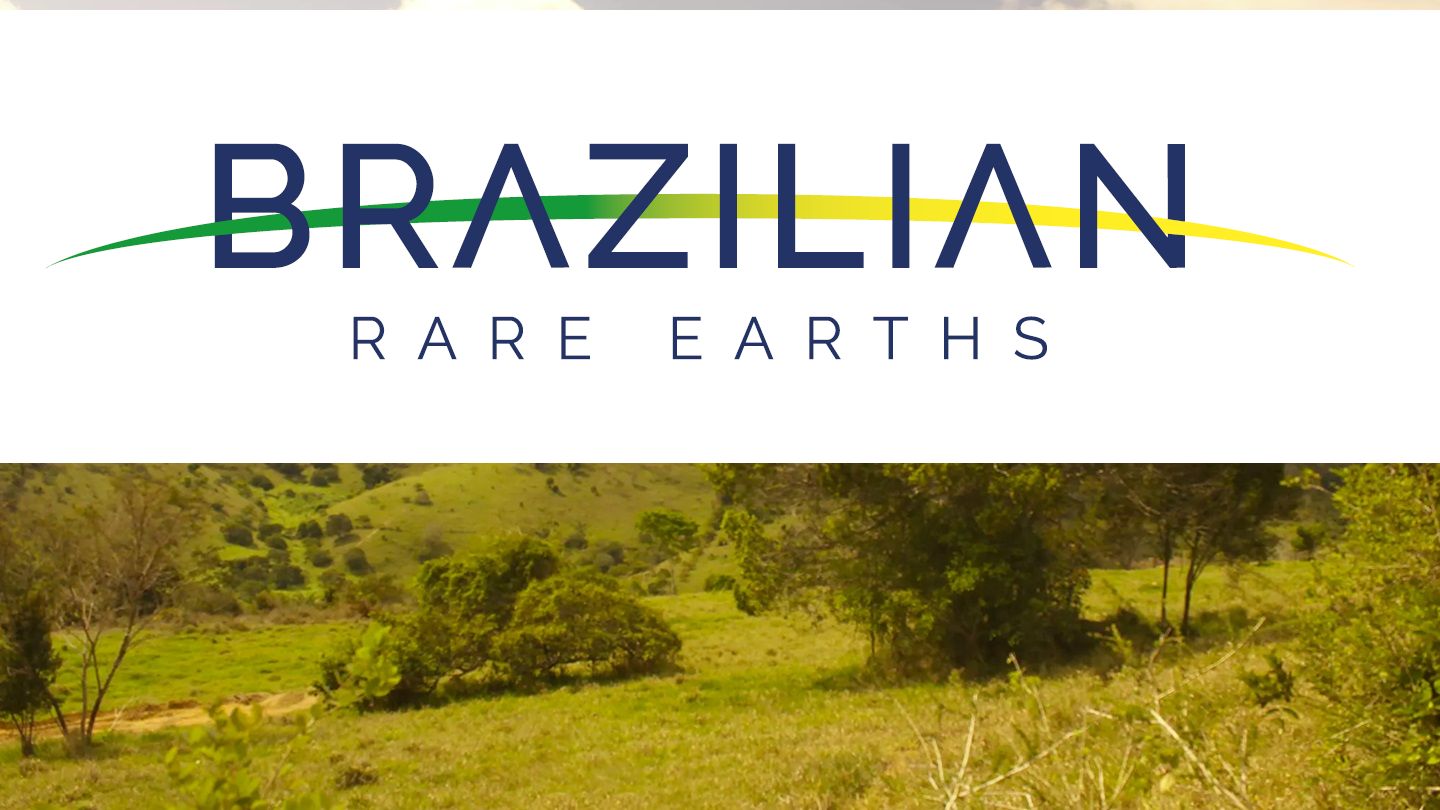
Ultra-High Grade Rare Earth Assays at Monte Alto Project
Sydney, Feb 1, 2024 AEST (ABN Newswire) - Brazilian Rare Earths Limited ( ASX:BRE) is pleased to report the initial assay results from the Phase I diamond drilling program at the Monte Alto Rare Earths Project ("Monte Alto") in Bahia, Brazil.
ASX:BRE) is pleased to report the initial assay results from the Phase I diamond drilling program at the Monte Alto Rare Earths Project ("Monte Alto") in Bahia, Brazil.
The assays reported are from 10 holes for a total of 1,634m from a 20 HQ and NQ diamond drill hole program for 3,104m at the Monte Alto project (Figure 1*). The drill program included 5 vertical holes totalling 703m and 15 angled holes totalling 2,400m.
Brazilian Rare Earths' CEO and MD, Bernardo da Veiga, commented:
"These exceptional high grade assay results validate Monte Alto as a world-class rare earth exploration project with some of the highest grades ever reported globally.
Exploration at Monte Alto is ramping up, with a Phase II diamond drilling program underway to target extensions to the high-grade REE-Nb-Sc mineralisation underneath the monazite-sand mineralisation at surface. There is excellent potential for this hard rock REE-Nb-Sc mineralisation to extend expansively under the Monte Alto Project area.
Our exploration team believes that this unique high-grade REE-Nb-Sc mineralisation is provincial in scale.
There is significant potential for new high-grade rare earth discoveries along the geophysical trendline that runs down the extensive spine of this world class province.
We recently commenced a diamond drill program at our Velinhas target, located 7km to the south of Monte Alto, and we have mobilised diamond drill rigs to confirm and extend high-grade REE-Nb-Sc mineralisation at the Sulista Project, located 80km southwest of Monte Alto. These exploration programs will be augmented with an increasing number of highly prospective regional drill targets."
The assay results include wide intervals of high-grade rare earth elements, niobium and scandium (REE-NbSc) mineralisation (+10% TREO) recorded in four holes and ultra-high grade REE-Nb-Sc mineralisation (+20% TREO) recorded in an additional six holes.
The Phase I diamond drilling program was designed to target a prospective corridor of high-grade REE-NbSc mineralisation over 800m long and 200m wide zone. This target corridor was defined by the results and analysis of prior BRE exploration programs, including a significant magnetic low anomaly, gravity survey, surface REE-Nb-Sc boulders/corestones and shallow auger drill results with grades of +1% TREO of monazite-sand in saprolite.
The northern part of this geological trend hosts numerous high-grade REE-Nb-Sc boulders/corestones and recorded three of the highest-grade auger holes previously drilled at the Monte Alto project (Drillholes: STU0349, STU0365 and STU0370 had average regolith grades ranging from 1.4% to 2.0% TREO). The southern part of the mineralised trend hosts zones of abundant, coarse-grained monazite (Drillholes: STU0181, SSU0014, & SSU0033 had average regolith grades ranging from 2.1% to 5.3% TREO) that appear to have been subject to less intense weathering and erosion.
BRE's exploration model is that the ultra-high grade REE-Nb-Sc mineralisation discovered across more than thirty large hard rock outcrops and boulders/corestones are remnants of large mafic cumulates of REE, niobium and scandium mineralisation. These magmatic cumulates are coeval with the leucogranites of the Rocha da Rocha Province, which have been discovered across a wide range of locations along the extensive geophysical trendline that runs down the spine of the province, including at the Velinhas and Sulista Projects which are respectively located 7km and 80km south of Monte Alto.
The exploration model posits that intense regolith weathering progressively eroded the high-grade REE-NbSc cumulates from an extensive hard rock deposit, into fractured corestones/boulders held within weathered saprolite and then ultimately into a highly weathered saprolite-monazite mineralised deposit (such as that delineated at shallow depths at the Monte Alto Project).
Diamond drilling at the northern end of the Monte Alto target corridor was completed at 40m to 80m spacings.
At the southern end of the target corridor, two diamond drill holes were completed 100m apart. Drilling intersected parallel horizons of monazite cumulate along a ~800m NE-oriented strike and to a maximum depth of 160m below surface (Figure 2*)
Individual cumulate horizons have true thickness ranging up to 20m in hole SDD009. At the northern end of the target exploration corridor, parallel REE-Nb-Sc mineralised horizons were intersected by holes MADD0013 and MADD0015 which extended over 24m cumulative true thickness at an average grade +15% TREO (Figure 3*). At the southern end, SDD0008 intersected ultra-high grade REE-Nb-Sc horizons of +20% TREO over 10m cumulative true thickness.
It is noteworthy that the REE-Nb-Sc mineralisation has remarkably low variability, with wide high-grade intervals ranging from 11.5% to 27% TREO. Horizon widths also demonstrate consistent grades, with the favourable exception of drillhole MADD0010 that intersected an ultra-high grade zone of 9m at 28.5% TREO from 91m within 23m at 18.9% TREO from 84m (Figure 4*). The low variability of diamond drill results are analogous with the highly consistent assays from the +30 ultra-high grade corestones/boulders that outcrop at Monte Alto.
The success of the Monte Alto Phase I diamond drilling program has established that the presence of highgrade monazite-sands in saprolite (+1% TREO), combined with magnetic and gravity geophysical data, as highly valuable exploration pathfinders to target hard rock REE-Nb-Sc mineralisation at depth (Figure 3*). These exploration pathfinders will be exploited across the Velinhas and Sulista targets - and following the re-assay of the Rio Tinto drill core/samples - will be used to identify 'Monte Alto' style exploration targets across this extensively drilled area.
High-Grade REE-Nb-Sc Mineralisation
The high-grade REE-Nb-Sc mineralisation at Monte Alto, Velinhas and Sulista targets has been predominately hosted in monazite, a phosphate mineral that contains ~55-60% REE oxides.
BRE has discovered numerous deposits of REE-Nb-Sc mineralisation across outcrops, boulders/corestones and drillholes containing ultra-high grade zones of monazite. These deposits occur as granular zones of up to ~40% by weight of monazite, or as veins of monazite/crandallite. The high-grade REE-Nb-Sc corestones/boulders and outcrops are encountered throughout the Monte Alto, Velinhas and Sulista targets, often along linear trends hundreds of meters in length.
Initial petrographic studies indicate that the REE-Nb-Sc mineralisation is primarily coarse-grained monazite which appears to occur as mega-enclaves within the felsic gneiss host rock.
The hard rock REE-Nb-Sc mineralisation has recorded exceptional grades of the key permanent magnet light rare earth elements of NdPr, the highly valuable heavy rare earth elements DyTb, as well as scandium and niobium. Assay results from the Phase I drilling program recorded one meter drill intercepts with rare earth grades of up to 34.4% TREO, up to 5.9% (59,100ppm) NdPr, 3,229ppm DyTb, 1.5% niobium and 352ppm scandium.
These ultra-high grade concentrations of monazite are interpreted to be analogous to cumulate deposits of minerals, such as ilmenite, which typically form large, extensive tabular orebodies, that can be tens of meters in thickness and kilometres in strike length.
Next Steps
The Monte Alto Phase II drilling program has commenced and will target high-grade REE-Nb-Sc mineralisation along strike and down dip directions, and also include systematic infill drilling of the known high-grade horizons. The hard rock Monte Alto REE-Nb-Sc deposit remains open along strike and at depth.
There is outstanding potential for new high-grade rare earth discoveries along the geophysical trendline that runs down the extensive spine of this world class province, including at the Velinhas and Sulista Projects which are located 7km and 80km south of Monte Alto respectively. Exploration at these priority targets has already commenced.
Rio Tinto Acquisition
In light of these favourable drilling results, and the prospects for high-grade REE-Nb-Sc mineralisation to repeat across the province, BRE has taken the strategic decision to accelerate the final two cash payments to complete the acquisition of Rio Tinto's exploration project (comprising of the 'Armargosa' tenements).
This key acquisition consolidates BRE's control of this world-class rare earth province, adding ~760km2 of important tenements that have excellent potential for high-grade REE-Nb-Sc mineralisation. The acquisition includes an extensive ~57,000m drilling/geological dataset that is being re-assayed for rare earths (most of the historical drill holes were not assayed for rare earth elements).
The rare earth re-assay program is progressing well and first assay results, expected to cover approximately 20-30% of the geological dataset, is expected by the end of February.
The final acquisition payment to Rio Tinto totals ~A$11.35m and will be funded from BRE's existing cash reserves.
*To view tables and figures, please visit:
https://abnnewswire.net/lnk/4R5QP52W
About Brazilian Rare Earths Limited
 Brazilian Rare Earths Limited (ASX:BRE) is an Australian company, rapidly advancing its Tier 1 rare earth project in Northeast Brazil.
Brazilian Rare Earths Limited (ASX:BRE) is an Australian company, rapidly advancing its Tier 1 rare earth project in Northeast Brazil.
Company exploration to date has discovered and delineated a globally significant, district-scale mineral province containing large volumes of both heavy and light rare earths critical to advanced industries and applications that will deliver a green energy transition.
The Company is led by a team of experienced mining executives and geologists with hundreds of years of cumulative experience in finding, developing, and operating mineral assets to generate value across a wide variety of jurisdictions, and commodities throughout the globe.
| ||
|



